By William C. Baker, for the Bay Journal News Service
In case anyone is asking: Warmer temperatures do hurt the Chesapeake Bay, in many ways.
In a February interview on a Las Vegas television station, Scott Pruitt, administrator of the U.S. Environmental Protection Agency, suggested a warming climate might actually be a good thing. “We know that humans have flourished during times of warming trends. So, I think there’s assumptions made that because the climate is warming that that’s necessarily a bad thing. Do we really know what the ideal temperature should be during the year 2100, or the year 2018?” he asked.
Here in the Chesapeake, there is overwhelming documentation of the damage that climate change will wreak on this national treasure. And it’s not just about the future. The inconvenient truth is that we’re already witnessing the damaging effects of climate change.
Based on long-term records from the piers at the Chesapeake’s two historic marine laboratories — dating back to 1938 at the Chesapeake Biological Laboratory on Solomon’s Island, MD, and to 1948 at the Virginia Institute of Marine Science at Gloucester Point — the Bay is getting warmer.
Warmer water has less capacity to hold dissolved oxygen, and dissolved oxygen is critical for life in the Bay, its rivers and its streams. Higher temperatures exacerbate the Chesapeake’s dead zones, expanding both the size and the duration of oxygen-deprived areas in the Bay.
Scientific models agree that storms will become more intense in the future. Storm intensity and increased rainfall will adversely affect the Bay’s ecological health. Increased scouring and runoff from more intense rain events, regardless of the season, carries significantly more nitrogen, phosphorus and sediment pollution to local rivers, streams and eventually, the Bay.
Increases in water temperature are known to affect the distribution and health of aquatic vegetation in the Chesapeake. For instance, species that are already stressed by high summer temperatures — such as the eelgrass, which provides important fish and crab habitats in the Lower Bay — may be greatly reduced or eliminated. Goodbye grasses. Goodbye crabs. Simply put, grasses equal crabs.
Warming waters caused by climate change also directly affect the distribution and range of animal species along the mid-Atlantic coast. Species at the southern end of their range, like soft-shell clams, are already retreating northward up the Atlantic Coast toward colder waters.
Atlantic menhaden, a critical forage fish in the Bay food web, haven’t produced strong year classes in the Bay in 20 years, possibly because climate-related shifts in ocean currents interfere with or interrupt their life cycles. The lack of strong menhaden reproduction in turn affects rockfish, which turn to blue crabs as a primary food source. That has negative nutritional consequences for the rockfish and obvious negative consequences for crabs.
And those same crabs may be facing new predators such as red drum, which have expanded their range northward into the Chesapeake.
There is no serious debate over the impact of climate change on the Bay. Climate change, and an EPA administrator continuing to ignore the science, are making all of our efforts to restore this national treasure much harder.
William C. Baker is president and CEO of the nonprofit Chesapeake Bay Foundation. His views do not necessarily reflect those of the Bay Journal.




bart stolp says
“We are in danger of destroying ourselves by our greed and stupidity. We cannot remain looking inwards at ourselves on a small and increasingly polluted and overcrowded planet.”
Stephen Hawking
James Reeves says
80 years in the scope of the age of the universe is statistically insignificant and the recent rise in temperature may cause alarm but, statistically, doesn’t show a shift. Current environmental models haven’t proven to be accurate yet we should listen to these “experts.” Science isn’t emotional. We need to (1) figure out how to live with the current warming trend while (2) trying to determine if it is permanent or just naturally occurring phenomena.
Bob Ingersoll says
Mr. Reeves:
There is no scientific evidence that our house will burn down, yet we buy insurance. There is no scientific evidence that our car will be involved in an accident, yet we are required to have insurance. We live on one very small planet, with a huge and growing population, and waiting around, without insurance, to see if Earth’s radical temperature change in a blink of a universe’s age is caused by our own actions or is just a “naturally occurring phenomena”, is just as wise as not insuring our house or car.
Our best insurance policy is breaking our fossil fuel habit, at least until we find out for sure what the true source of the rapid temperature rise is, in provable fact. Try to “live with the current warming trend” is what we tell frogs as we place them in a pot of cold water and turn on the stove. It does not work so well with billions of world citizens without access to 24/7 air conditioning.